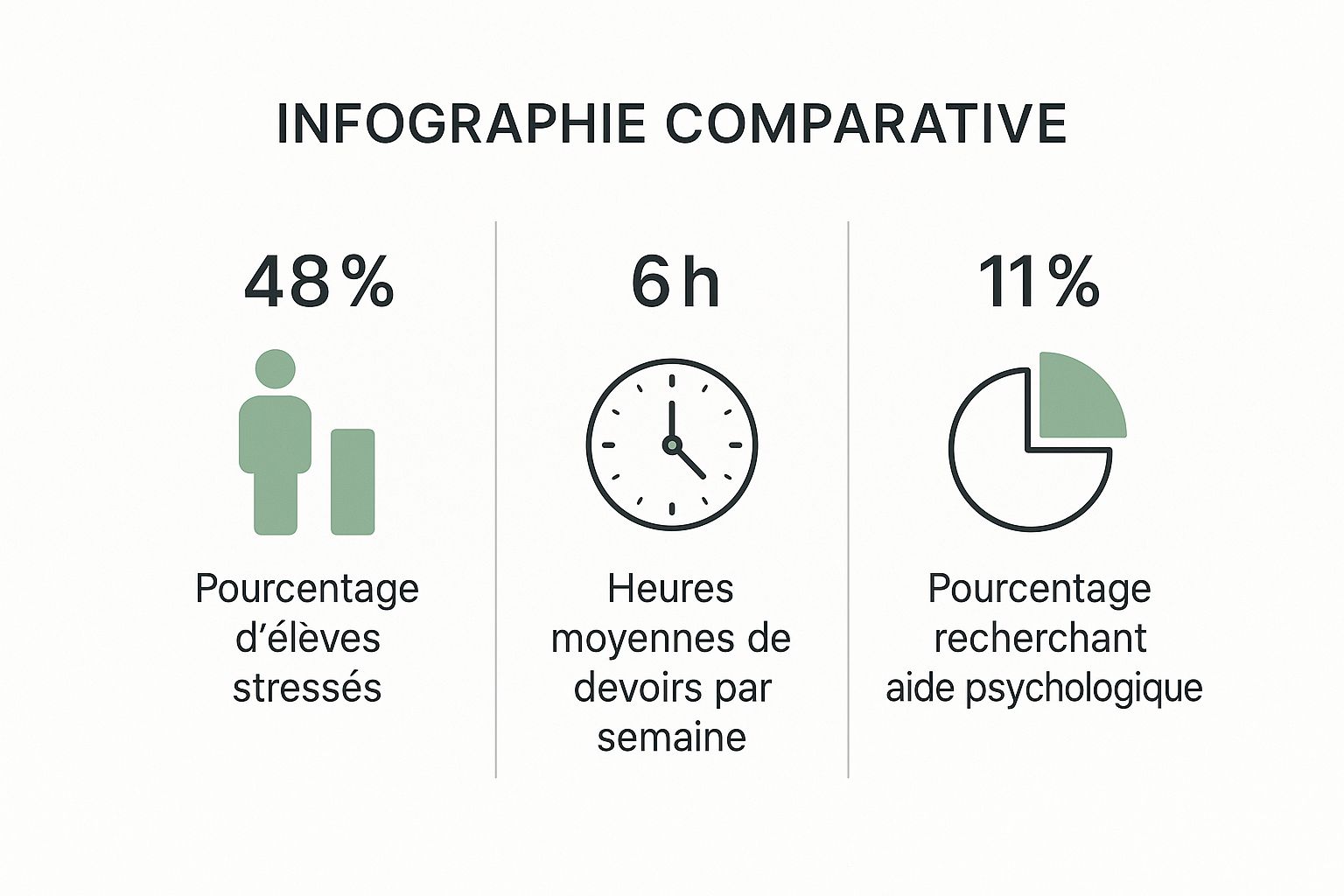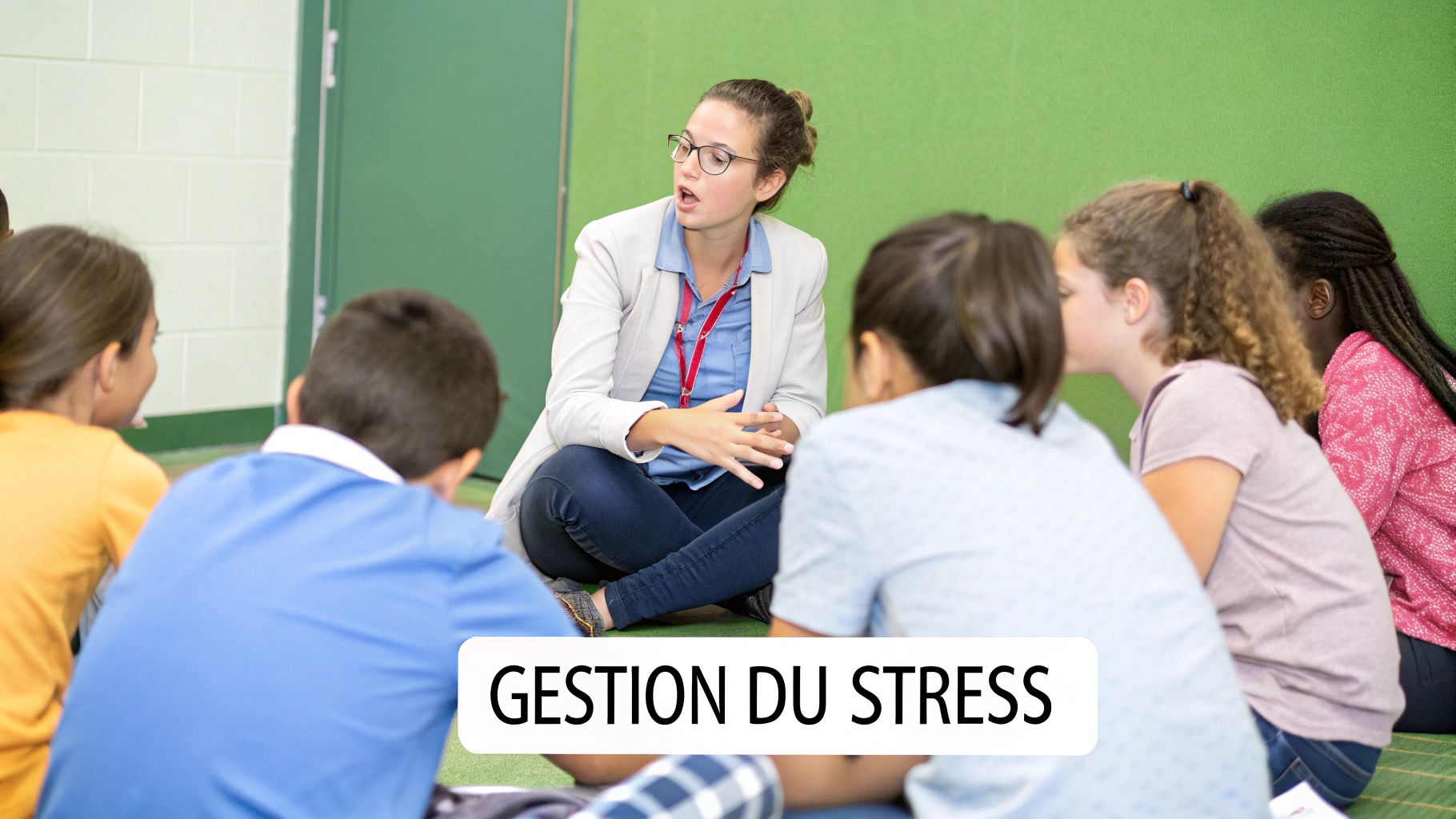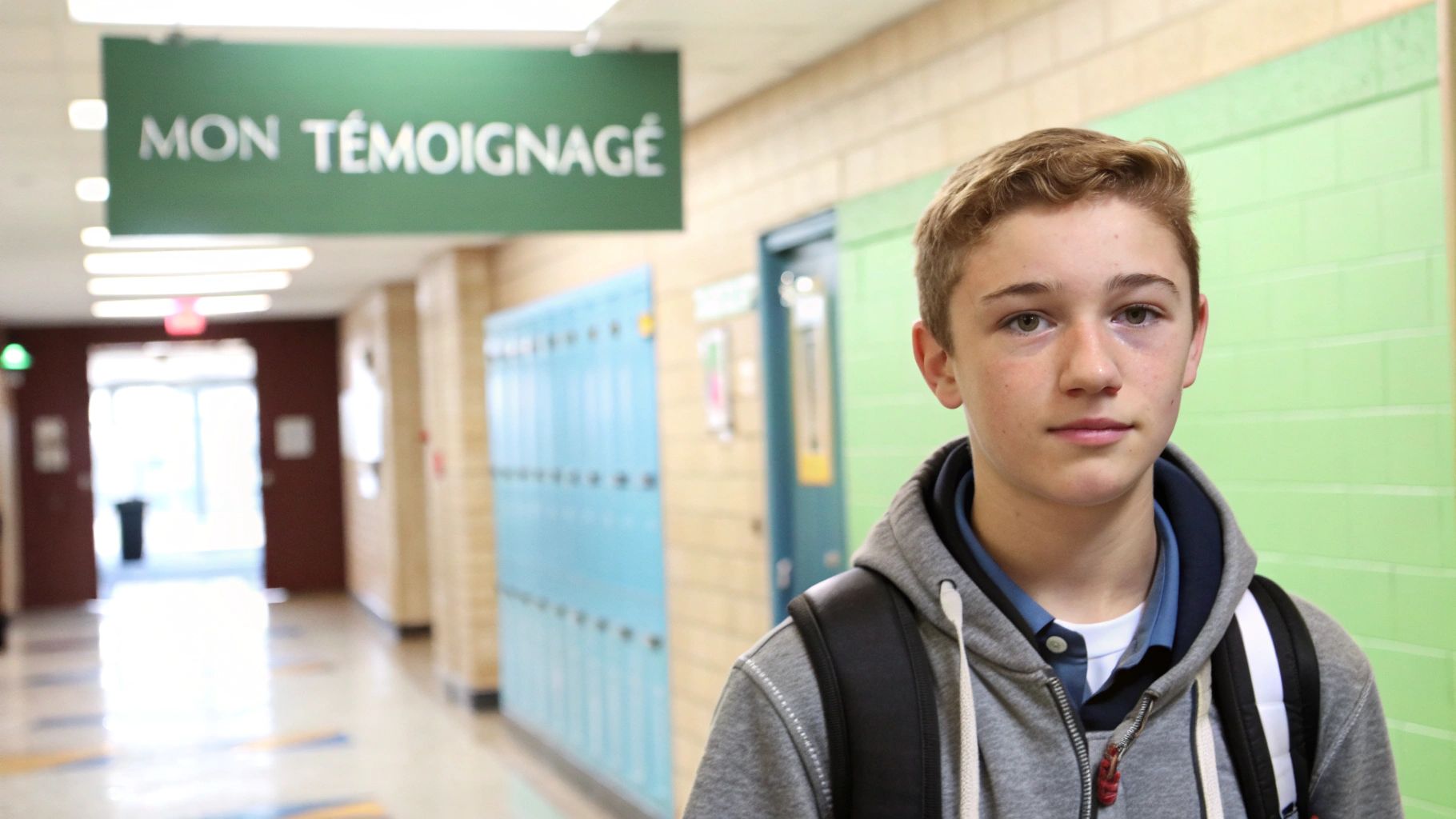Academic pressure for a primary school child isn't just a little bit of stress before a test. It's a much heavier, often invisible burden that manifests itself through sometimes very subtle signs. Learning to decode them is the very first step in helping your child rediscover their lightness and joy of learning, while protecting their emotional well-being.
Spotting the signs of academic pressure
Academic pressure isn't just about the fear of a bad grade. For a child between the ages of 6 and 12, it's a complex cocktail made up of your expectations (even if they're benevolent), those of their teachers, and, above all, their own. Your role as a parent isn't to judge, but to observe, to listen carefully to differentiate between simple temporary fatigue and real discomfort.
This stress doesn't always scream its name. It often hides behind small changes in behavior that could easily be attributed to a "bad patch."
Physical and emotional clues that should alert you
The most common signs aren't always directly related to school, which complicates things a bit. Stay alert if you notice these behaviors persisting:
- The body that speaks : Stomach aches or headaches that come back like clockwork, especially in the morning before leaving. Sleep that becomes restless, with difficulty falling asleep, nightmares or waking up in the middle of the night.
- Raw emotions : Unusual irritability, heightened sensitivity, or crying spells that seem out of proportion.
- Loss of desire : He turns his back on his favorite toys, no longer wants to do the activities he used to love, or is reluctant to see his friends.
As a parent, sometimes the hardest part is accepting that our child's stress is real. These aren't tantrums. They're simply their way of expressing that they're carrying too much weight for their little shoulders.
Signals directly related to school
Sometimes the clues are more obvious. They creep into little phrases or attitudes that betray a fear of not measuring up. You might hear them say, "I'm terrible at math anyway," or "I'll never be able to do it."
This anxiety is often a reflection of a system that can be demanding. The French school system is known for the intensity of the work required of students, which is a major factor in the pressure. On average, French middle school students spend 5 hours per week doing homework, a burden that can quickly become overwhelming. To better understand this context, you can consult this insight into the French school system .
To go beyond these observations, nothing beats a good conversation. Rather than the classic "So, was school good?", try more open-ended questions. "Tell me the funniest thing that happened to you today?" or "Was there a time when you felt a little sad or angry?" The idea is to create a moment of trust where he knows he can tell you anything, without fear of disappointing you.
Create a family cocoon far from performance

Your home should be a refuge, a place where your child can unwind and recharge, away from the hustle and bustle of school. It's not an annex to the classroom. Faced with a school system that can sometimes be very demanding, building this haven of peace is undoubtedly your best asset for protecting their balance.
To achieve this, there's no need to revolutionize everything. The idea is to subtly shift the focus: less emphasis on raw performance and instead celebrate effort, curiosity, and the simple joy of being together.
Value efforts more than results
The first instinct when coming home from school is often to ask, "So, how much did you get?" It's human, but this question, asked day after day, sends a clear message: it's the grade that counts above all.
Instead, try to change your approach. Take an interest in the process.
Notice how persistent he is on a difficult math exercise, even if the result isn't perfect. A simple, "I saw how hard you worked, I'm really proud of your effort," will have a much more positive impact on his self-confidence than a question about his grade.
Your child's worth isn't measured by their report card. Your love is unconditional. It's vital that they feel that way every day, especially when school becomes a source of academic pressure .
This approach is all the more important given that school-related stress is a growing reality. In France, academic pressure has skyrocketed in recent years, particularly affecting adolescent girls. A report from the World Health Organization revealed that nearly 63% of 15-year-old girls feel under pressure, a feeling often compounded by perceived insufficient family support. You can read the details of this WHO report to learn more.
As a parent, your support is their best shield. Show them you're on their team. A bad grade isn't a tragedy; it's just information that will help them improve.
Establish family rituals disconnected from school
To counterbalance homework and grades, there's nothing like creating family moments where performance has no place. These rituals anchor their identity well beyond their role as a student.
Some simple ideas to pick up and adapt:
- Board game night: Once a week, we take out the games, turn off the screens, and the only goal is to have fun. Laughter and camaraderie, that's all.
- Sunday night reading time: Everyone has their own book, snuggled up on the couch with a hot chocolate. Thirty minutes of quiet time to associate reading with pure pleasure, not an academic requirement.
- Nature Expedition: On weekends, a walk in the forest or a park works wonders. Let your child run around, observe small creatures, or build a cabin. These activities are powerful stress relievers.
These moments may seem trivial, but they are essential. They remind your child that their personality is rich and that their importance to you has nothing to do with their grades. You are showing them that they are loved for who they are, quite simply.
Play and creativity, your child's best allies
When faced with the pressure of grades and expectations, one of the most effective remedies isn't found in textbooks, but rather in a toy box, at the bottom of the garden, or in a box of crayons. Free play—that precious time when your child is the sole captain of their ship—is much more than just a distraction. In fact, it's a key pillar of their balance and development.
When a child plays without a specific goal, just for fun, they learn to negotiate, to invent stories, to resolve the minor conflicts of their imaginary characters. Without even realizing it, they practice managing life's very real challenges, whether in the playground or in the classroom.
This image highlights a worrying reality: the rise of academic stress and the burden of homework. These figures confirm why play is so vital.

The data is clear: time spent on schoolwork is increasingly encroaching on free time. Yet, it's precisely when stress increases that these moments of escape become absolutely crucial.
How to make room for play?
Encouraging play doesn't mean overloading an already busy schedule. Quite the opposite! It's about creating breathing spaces, protecting stress-free moments, and resisting our instinct to plan everything.
Here are some simple ideas, tested and approved by many parents:
- The Trinket Box: Take a large box and fill it with recycled materials: cardboard, scraps of fabric, toilet paper rolls, string, tape, etc. Place it in a corner and let your child take it, without any instructions. You'll be surprised to see what can come out!
- Taming Boredom: When your child sighs, "I'm bored...", take a deep breath and don't rush to suggest an activity. Boredom is the breeding ground for creativity. It's often in this "void" that the most brilliant ideas take root.
- Protect decompression time: When you get home from school, establish a relaxation ritual before starting homework. A time to draw, build LEGO, flip through a comic book, or simply daydream by the window. This time is essential.
Play isn't just a break from learning. It's learning itself. It's through play that your child cultivates creativity, problem-solving skills, and resilience—skills far more valuable than a perfect grade on a report card.
To help you see things more clearly, it's helpful to distinguish between activities that aim for performance and those that foster fulfillment. The following table illustrates this fundamental difference.
Comparison of types of activities for children
This table highlights the differences in impact between performance-oriented activities and those focused on well-being and creativity, helping parents make informed choices for their child's balance.
| Criteria | Performance-oriented activities (e.g., sports competition, music lessons with exam) | Activities focused on development (e.g. free play, drawing without instructions, walk in the forest) |
|---|---|---|
| Main objective | Achieve a measurable result (win, get a grade, pass a level). | Explore, have fun, feel joy in the process itself. |
| Source of motivation | Often external: medals, grades, approval from adults. | Purely internal, driven by curiosity and personal pleasure. |
| Error handling | Mistakes are seen as failures to be avoided at all costs. | The mistake is simply information, an opportunity to learn or try something else. |
| Impact on stress | Can easily increase academic pressure and performance anxiety. | Reduces stress by providing a natural outlet for emotions and creativity. |
Ultimately, the idea isn't to ban structured activities, but to find the right balance. By prioritizing free play and fun-focused activities, you're giving your child the greatest gift of all: the freedom to simply be themselves, free from the constant pressure to be the best.
Cultivating authentic self-confidence

For a child, strong self-confidence is probably the best shield against academic pressure . When a child feels good about themselves, criticism or poor grades have much less impact. But be careful, this confidence is not built solely on academic success. It is rooted in the deep feeling of being loved and appreciated for who they really are, beyond report cards.
To help him develop this inner strength, the secret is to shift the focus from what he does to who he is . His grades are only a tiny part of him. Take a moment to observe and, more importantly, to put into words his unique qualities, the ones that make him so special in your eyes.
Highlighting one's human qualities
Your child is so much more than just a student. They possess a multitude of qualities that are not valued at school, yet are essential to their well-being and happiness.
Learn to spot them and tell them to him, simply. For example:
- "I saw how patient you were with your little brother earlier, that's a really great quality."
- “You have an incredible sense of humor, you always make me laugh out loud!”
- “Your cabin in the living room is super creative. I love your imagination.”
These small remarks, given daily, reinforce his self-esteem much more lastingly than a simple "well done" for a good grade. They show him that his worth does not depend on his performance, but that it is deeply rooted in him.
Self-esteem is like a small plant. It must be watered regularly with words that value not only its achievements, but also its personality, kindness, and creativity.
Make him feel competent and useful
Feeling competent doesn't just happen at school—quite the opposite! Offering your child other opportunities to experience success is an excellent strategy for building their confidence. How? By giving them small, age-appropriate tasks.
The goal is simple: to help him say to himself, "I can do this on my own." Every small task accomplished is another brick he adds to the wall of his confidence.
- Between 6 and 8 years old: Take care of a plant, set your own table, put away your toys.
- Between 9 and 12 years old: Participate in preparing the meal (washing the salad), be responsible for taking out the recycling bin, read a story to the youngest sibling.
Also, consider encouraging them to share their opinions, even if they differ from yours. By actively listening to them (“That’s an interesting perspective, explain your point of view”), you send a powerful message: “What you think matters to me.” Feeling competent and listened to at home will lay the foundation for them to face external challenges.
Collaborate with the school and ease the homework routine
The bridge between home and school is often the key to easing the burden on your child's shoulders. It's tempting to see the teacher as a source of pressure, but in reality, they are your greatest ally. Smooth and sincere communication can truly make all the difference.
Your child spends all day in class, but it's at your home that they release their pressure. You're the first person to witness their anxieties or fatigue. By approaching meetings with the teacher as a team effort, not a confrontation, you open the door to much more effective support.
Establish a constructive dialogue with the teacher
For the exchange to be truly useful, a little preparation can go a long way. The idea isn't to arrive with a list of complaints, but rather with concrete observations and questions.
Here are some ideas to start the discussion:
- Share what you observe: Put into words what worries you. For example: "For some time now, we've noticed that Leo has a stomach ache every morning before leaving for school" or "When he talks about his homework, he puts himself down a lot, he says he's useless."
- Ask open-ended questions: Try to understand what's going on on the other side. "How are you finding him in class right now?", "What are the main expectations for this term?", "Are there any concepts he seems particularly struggling with?"
- Offer to team up: Clearly demonstrate your willingness to collaborate. “What could we do at home to help him that is consistent with your approach in the classroom?”
This approach is essential, especially when we know that academic pressure can have a real impact. The figures prove it: in France, 13% of children aged 6 to 11 have probable mental health problems. Acting early puts all the odds in your favor. If you'd like to learn more, you can delve deeper into the subject of youth mental health to better understand these issues.
Transforming the chore of homework
Ah, homework! This is often where the day's tensions explode. Making this time more serene can transform the family atmosphere. Your role isn't that of a monitor of completed work, but rather that of a caring coach, there to encourage.
The goal of homework isn't to achieve perfection at all costs. It's to preserve your child's desire to learn and, most importantly, the quality of your relationship. Sometimes the greatest gift you can give them is to let go of an exercise that's holding them back.
Establish a simple and reassuring framework. A short routine, for example, 20 to 30 minutes of work after snack time and a little time to unwind, in a quiet place, away from screens.
If your child gets stuck, getting upset is the worst thing you can do. Simply suggest a break, reassure them ("It's okay, we'll look at it later in peace"), and come back to it a little later, with a fresher mind. If they stumble on an exercise, remind them that making mistakes is a normal part of learning. Your calm demeanor is their best defense against the performance anxiety that fuels academic pressure.
We answer your questions about academic pressure

As parents, we have a thousand questions about our children's academic progress. This is completely normal. When academic pressures become a factor, we can quickly feel a little lost, trying to figure out how best to support them. Let's unravel some of the most common questions together.
The idea isn't to have a ready-made answer, but rather to give you concrete ideas for acting gently and protecting your child's well-being. Never forget: you are their pillar of strength.
How to differentiate between encouragement and pressure?
The line may seem blurry, but for a child, the impact is radically different. Encouragement is what gives wings and builds confidence. Pressure, on the other hand, is a crushing weight that breeds anxiety.
To see things more clearly, ask yourself what the intention is behind your words.
- Encouragement is about focusing on the journey you've made. It values effort, curiosity, and the joy of learning. A sentence like "I saw all the effort you've made, it's great!" emphasizes perseverance, regardless of the end result. It's unconditional support.
- Pressure, on the other hand, only looks at the result. It compares and judges. "You must get the best grade in the class" or "Do better than your cousin" are phrases that directly link the child's worth to their performance.
How do you know if you're on the right track? Observe your child. Do they feel supported, motivated, and confident? Or, on the contrary, do you see them as stressed, anxious, and terrified of disappointing you? Your words should be a springboard, never a burden.
My child no longer wants to go to school, is it because of the pressure?
A child who refuses to go to school is a warning sign that should be taken very seriously. Grade pressure is often one of the first causes that comes to mind, and it's a perfectly plausible explanation.
But this is not always the only explanation. This refusal can hide many other things: difficulties with others (a conflict with a friend, a feeling of being left out) or an as yet undetected learning disability that is causing failure and generating significant anxiety.
The first thing to do is to discuss it with him, calmly, without judgment. Try to understand what triggers this fear. A particular class? The fear of being questioned at the board? Recess time? A discussion with his teacher is then essential. If the problem persists, a school psychologist or an outside professional can be of great help.
Do extracurricular activities add extra pressure?
It's all about balance and intention. An activity chosen by the child, one that gives them joy and space to express themselves, is a breath of fresh air and an excellent remedy for stress.
On the other hand, it can become a source of pressure if:
- The child's schedule is overloaded, with no time left to do nothing or play freely.
- The activity is imposed by parents, sometimes to realize a dream that they were unable to accomplish themselves.
- The focus is solely on competition and performance, to the detriment of the simple pleasure of practicing.
The key is to keep some "empty time" in the week. Sports or art should remain a source of fulfillment, not another box to check off in an already busy schedule.
The My Book Story notebook was designed as a caring companion. It helps your child put their emotions into words and build their self-confidence. Through fun and creative activities, they learn to know themselves better, far from the pressure of achieving results. Give them a space just for them by discovering the My Book Story notebook .


